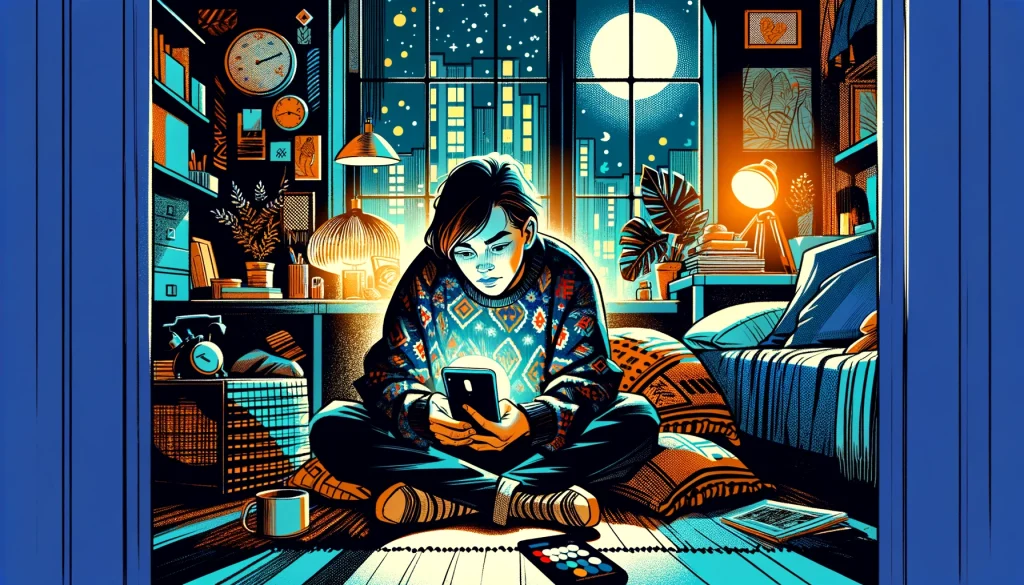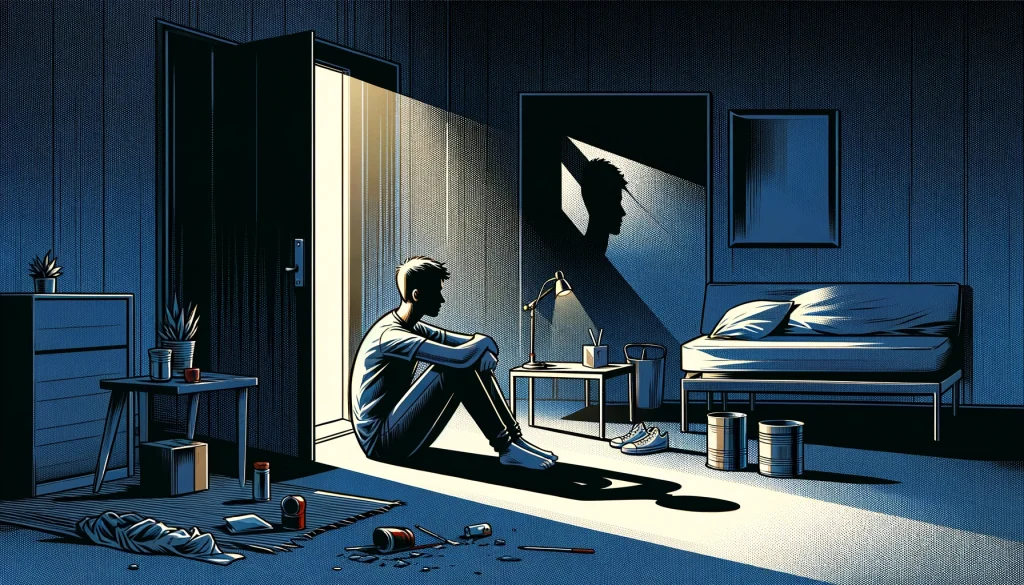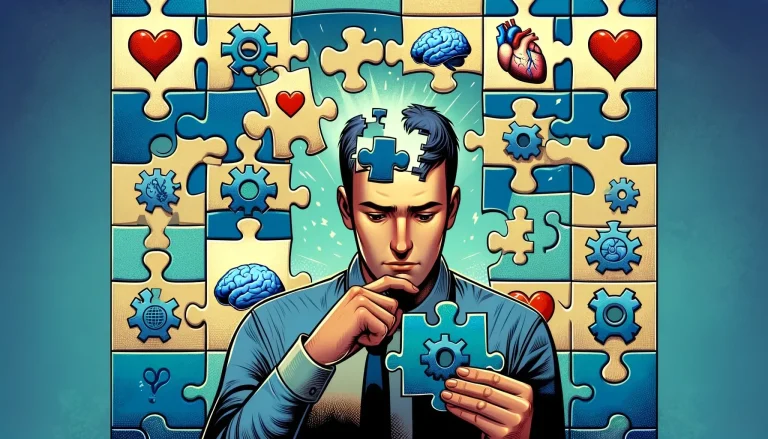Hey there, folks!
Going through a breakup can be tough, and it’s not uncommon to find yourself disappearing after being dumped. It’s a phenomenon that’s more common than you might think.
In this blog post, we’re diving deep into the “12 Reasons for Disappearing After Being Dumped.”
So, why do people sometimes vanish after a breakup? Well, there’s no one-size-fits-all answer, but we’ll explore the psychology behind it and provide some insights that could shed light on your own experiences or those of your friends.
We’ve all been there, feeling like you want to hide away from the world or even from your ex. It’s a natural response to the whirlwind of emotions that come with a breakup. But there’s more to it than just wanting some space.
Throughout this post, we’ll delve into the complex web of emotions, fears, and coping mechanisms that lead to disappearing acts. We’ll also provide some practical advice on how to deal with these feelings and make a positive comeback.
So, if you’ve ever wondered why you or someone you know has vanished into thin air after a breakup, stick around! We’re about to unravel the mystery and offer some valuable insights and solutions.
Here’s what we’ll be covering:
- Fear of Confrontation
- Emotional Overwhelm
- Loss of Identity
- Seeking Independence
- Healing in Solitude
- And much more!
Ready to get started? Let’s dive in and understand the psychology of disappearing after being dumped.
12 Reasons for Disappearing After Being Dumped
| Reasons for Disappearing After Being Dumped | Explanation |
|---|---|
| Overwhelming Emotions | When faced with a breakup, individuals may experience a flood of intense emotions, making them seek solitude to process their feelings. |
| Avoiding Confrontation | Some people fear awkward or painful conversations with their ex-partner and choose to disappear to avoid these interactions. |
| Loss of Self-Identity | A breakup can leave a person feeling lost and disconnected from their identity within the relationship, leading to a need for self-discovery. |
| Seeking Independence | After a breakup, individuals might yearn for independence and personal growth, motivating them to create distance from their past. |
| Healing in Solitude | Solitude provides a space for self-reflection and healing, allowing one to mend emotional wounds without external distractions. |
| Fear of Judgment | Fear of judgment from mutual friends or social circles can drive people to retreat temporarily to protect their self-esteem. |
| Preserving Self-Esteem | Disappearing can be an attempt to maintain self-esteem by avoiding witnessing the ex-partner moving on or dating someone new. |
| Reconnecting with Friends | Post-breakup, individuals often reconnect with friends who were less prominent during the relationship, prioritizing these bonds. |
| Focus on Personal Growth | Taking time away allows for personal growth, self-improvement, and pursuing new interests or passions independently. |
| Reestablishing Boundaries | Some people disappear to redefine boundaries and regain a sense of autonomy that might have been compromised during the relationship. |
| Avoiding Drama | Disappearing can prevent unnecessary drama or conflicts with the ex-partner, reducing the emotional strain on both parties. |
| Coping Mechanism | Vanishing serves as a coping mechanism to process grief and loss, providing a necessary period of emotional recovery. |
These reasons encompass the complexities and emotions that lead individuals to disappear after being dumped, shedding light on the various motivations behind this common post-breakup behavior.
Overwhelming Emotions
Breakups are an emotional rollercoaster. The overwhelming rush of feelings can leave anyone feeling like they’re drowning in a sea of sorrow, anger, and confusion.
It’s like being caught in a storm, and sometimes, the only way to weather it is to disappear for a while.
A Whirlwind of Emotions
When someone goes through a breakup, they often experience a cascade of emotions – sadness, anger, guilt, and even relief. It’s like a storm inside their heart and mind, and dealing with all of it can be daunting. The intensity of these emotions can make it challenging to function in daily life.
Disappearing after being dumped might seem like an escape from the turmoil. It’s a way to find a quiet, safe harbor where they can gather their thoughts, process their emotions, and regain their composure. This time away from the world can be essential for self-healing.

Personal Experience
I’ve been there myself, caught in the whirlwind of emotions after a breakup. It’s not easy to go about your daily routine when your heart feels heavy, and your thoughts are consumed by memories of the past.
In those moments, vanishing from the world temporarily provided me with the space I needed to confront my emotions head-on.
Research in psychology supports this need for solitude during emotional upheaval. It suggests that taking time for introspection and self-care can significantly improve one’s mental well-being during tough times.
So, disappearing after being dumped isn’t just about running away; it’s about finding a sanctuary to heal and grow stronger.
Avoiding Confrontation
Breakups can be emotionally charged, and facing your ex-partner in the aftermath can be incredibly uncomfortable. Some individuals choose to disappear to avoid the inevitable confrontation.

Awkward Conversations
When a relationship ends, there are often unresolved issues, unspoken words, and lingering questions. Confronting an ex-partner can lead to difficult and emotionally charged conversations. The fear of these awkward interactions can be a powerful motivator to disappear and create distance.
Disappearing allows individuals to sidestep the discomfort of facing their ex-partner and dealing with the aftermath of the breakup. It provides them with a temporary shield from potentially painful confrontations.
Personal Experience
I’ve seen friends and acquaintances struggle with this aspect of post-breakup dynamics. They often express their desire to avoid those tense conversations with their exes, fearing that it might reopen old wounds or lead to unnecessary conflicts. It’s a valid concern, and disappearing can sometimes be a practical way to protect oneself from such emotional turmoil.
Studies on interpersonal communication affirm the importance of healthy boundaries and effective communication in maintaining emotional well-being. In some cases, taking a step back and avoiding confrontations can be a means of self-preservation and emotional stability.

Loss of Self-Identity
In the midst of a romantic relationship, individuals often merge their identities with their partners. After a breakup, they might feel a loss of self-identity and disappear in search of their true selves.
Identity Within a Relationship
In a committed relationship, it’s common for individuals to intertwine their lives, interests, and even their sense of self with their partner. Over time, they become a part of a collective “we” rather than a distinct “I.” When the relationship ends, this loss of shared identity can be disorienting.
Disappearing after being dumped can be an attempt to reclaim a sense of self that was overshadowed by the partnership. It’s an opportunity for personal rediscovery and self-empowerment.
Personal Experience
I’ve witnessed friends who, after the end of a long-term relationship, embarked on journeys of self-discovery. They needed time away to explore their interests, rediscover their passions, and redefine who they were outside of the relationship.

Psychological research emphasizes the importance of maintaining a strong sense of self-identity, even within a relationship. Disappearing temporarily can provide the solitude needed to reconnect with one’s individuality and regain a sense of self.
Seeking Independence
Independence can be a compelling reason for disappearing after being dumped. The desire to break free from the constraints of a relationship and regain personal autonomy often drives individuals to create space.
Yearning for Freedom
During a relationship, some people may feel that their independence has been compromised. They might have made compromises, adjusted their plans, or given up certain aspects of their lives for the sake of the partnership. After a breakup, the longing for freedom and the ability to make decisions independently can be powerful motivators.

Disappearing offers a chance to reclaim that freedom. It allows individuals to prioritize their own needs, dreams, and aspirations without the influence or expectations of a partner.
Personal Experience
I’ve seen friends who, after the end of a long-term relationship, felt a burning desire to reassert their independence. They wanted to rediscover the joys of making decisions solely for themselves, without considering the impact on a partner.
Psychologists often discuss the importance of personal autonomy in maintaining a healthy sense of self and well-being. Disappearing after being dumped can serve as a means to regain that autonomy and nurture a stronger sense of self-reliance.
Healing in Solitude
Solitude has a unique way of fostering healing and self-reflection. Disappearing after being dumped can provide the necessary space and quietude for individuals to mend their emotional wounds.
The Power of Solitude
In the aftermath of a breakup, solitude offers a retreat from the noise and chaos of daily life. It provides an opportunity to turn inward, confront one’s emotions, and embark on a journey of self-discovery. Solitude can be a healing balm for a wounded heart.

Disappearing allows individuals to immerse themselves in this healing process. It’s a chance to engage in self-care, reflect on past experiences, and gradually rebuild emotional resilience.
Personal Experience
I’ve experienced the healing power of solitude firsthand. There were moments when I needed to step away from social obligations and distractions to truly process the pain and emotions of a breakup. Solitude provided me with the clarity and serenity necessary for healing.
Psychological studies confirm that solitude can be beneficial for emotional well-being. It allows individuals to confront their thoughts and emotions in a safe and controlled environment. Disappearing after being dumped isn’t about isolation; it’s about finding solace in solitude and emerging stronger from the experience.
Fear of Judgment
The fear of judgment from mutual friends, acquaintances, or social circles can be a potent force driving individuals to disappear after being dumped.
The Weight of Social Expectations
In many social circles, relationships are a significant part of one’s identity. When a breakup occurs, there can be a sense of shame or embarrassment associated with it. People may worry about how they will be perceived by others, especially if they were part of a close-knit community.
Disappearing allows individuals to step out of the spotlight temporarily. It offers respite from potential judgment and provides a buffer against the prying eyes and well-intentioned but often intrusive questions from others.

Personal Experience
I’ve seen friends who, after a breakup, felt the weight of social expectations and the pressure to maintain a certain image. They chose to disappear briefly to shield themselves from the scrutiny and opinions of those around them.
Psychological research highlights the significance of social support during difficult times, but it also acknowledges the importance of setting boundaries to protect one’s emotional well-being. Disappearing can be a way to strike that balance and preserve one’s dignity in the face of judgment.
Preserving Self-Esteem
Preserving self-esteem is another reason why individuals opt to disappear after being dumped. It’s a way to shield themselves from witnessing their ex-partner moving on or dating someone new, which can be emotionally challenging.
Protecting Self-Worth
Breakups can be a blow to one’s self-esteem. The idea of seeing their ex-partner with someone new can be painful, and it may evoke feelings of jealousy, insecurity, or inadequacy. To avoid this emotional turmoil, some people choose to vanish temporarily.

Disappearing provides a buffer against the potential heartache of witnessing their ex-partner’s new romantic endeavors. It allows individuals to protect their self-worth and emotional stability during a vulnerable time.
Personal Experience
I’ve known individuals who, after a breakup, were deeply affected by the thought of their ex-partners moving on. They needed time away to rebuild their self-esteem and gain the emotional strength to face such situations without feeling overwhelmed.
Psychological studies emphasize the importance of self-compassion and self-care during a breakup. Disappearing after being dumped can be seen as an act of self-compassion, allowing individuals to shield themselves from unnecessary emotional distress.
Reconnecting with Friends
Breakups often result in changes in social dynamics. Some individuals disappear to reconnect with friends and rebuild neglected relationships.
Rekindling Friendships
During a relationship, it’s common for individuals to prioritize their partner’s company over other social connections. Friendships may take a backseat, and over time, these bonds can weaken. After a breakup, there may be a desire to revive those friendships and seek support from friends who were less prominent during the relationship.

Disappearing temporarily from the dating scene allows individuals to invest time and energy in rekindling old friendships. It provides an opportunity to lean on the support of friends and rebuild a social support network.
Personal Experience
I’ve witnessed the joy of friends who, after a breakup, found solace in reconnecting with long-lost friends and strengthening those relationships. They realized the importance of nurturing friendships outside of romantic commitments.
Research in social psychology emphasizes the vital role of social support in coping with difficult life events. Disappearing after being dumped can be a strategic move to tap into that support system and gain emotional stability during a challenging period.

Focus on Personal Growth
Disappearing after being dumped can also be a conscious choice to focus on personal growth, self-improvement, and pursuing new interests or passions independently.
Self-Improvement Journey
A breakup can be a turning point in one’s life. Instead of dwelling on the past, some individuals see it as an opportunity for personal growth. They may choose to disappear to dedicate time and energy to self-improvement endeavors, such as fitness, education, or career advancement.
Disappearing offers the freedom to explore new interests, set ambitious goals, and work toward becoming the best version of oneself. It’s a deliberate step towards personal development and empowerment.
Personal Experience
I’ve known people who, after a breakup, channeled their energy into self-improvement projects and witnessed remarkable transformations. They embraced the chance to rediscover their passions and create a brighter future for themselves.

Psychological studies confirm that setting and achieving personal goals can boost self-esteem and overall well-being. Disappearing after being dumped can provide the necessary space and focus to embark on this empowering journey of self-growth.
In the next sections, we’ll delve into more reasons why people disappear after being dumped, shedding light on the diverse motivations behind this common post-breakup behavior. Each reason reflects the unique experiences and emotions that individuals navigate as they seek healing and personal growth.
Reestablishing Boundaries
Disappearing after being dumped can serve as a means to reestablish personal boundaries and regain a sense of autonomy that might have been compromised during the relationship.
Reclaiming Independence
In some relationships, individuals may find themselves sacrificing personal boundaries and autonomy for the sake of their partners. Over time, this can lead to a feeling of suffocation or loss of control over one’s life. After a breakup, there may be a strong desire to reclaim that independence.
Disappearing offers the space needed to set and reinforce healthy boundaries. It allows individuals to redefine what is acceptable and regain control over their own lives, free from the influence of a partner.
Personal Experience
I’ve seen friends who, after a breakup, felt a need to reestablish boundaries that had blurred during their relationships. They needed time away to rediscover their personal space and assert their independence.
Psychological research emphasizes the importance of maintaining individual boundaries within a relationship. Disappearing after being dumped can be a deliberate step towards reclaiming those boundaries and preserving one’s sense of self.

Avoiding Drama
Breakups can sometimes be accompanied by dramatic and emotionally charged situations. Disappearing can be a strategy to avoid unnecessary conflicts and reduce the emotional strain on both parties involved.
Stepping Away from Drama
Emotional turmoil often accompanies breakups, and interactions between ex-partners can be rife with tension, arguments, and misunderstandings. To prevent such drama and protect their emotional well-being, some individuals choose to disappear temporarily.
Disappearing provides a respite from the chaos of post-breakup drama. It allows individuals to distance themselves from potentially harmful conflicts and focus on their own emotional recovery.

Personal Experience
I’ve observed situations where staying in close contact with an ex-partner led to ongoing arguments and hurtful exchanges. In those cases, disappearing was a way to create space and prevent further emotional damage.
Psychological studies highlight the importance of avoiding unnecessary conflicts for emotional well-being. Disappearing after being dumped can be a practical choice to minimize emotional stress and facilitate a smoother transition to post-breakup life.
Coping Mechanism
Finally, disappearing after being dumped can be viewed as a coping mechanism to process grief and loss. It provides a necessary period of emotional recovery and self-care.
Coping with Grief and Loss
Breakups signify the loss of a significant relationship, and grieving that loss is a natural part of the healing process. Disappearing allows individuals to cope with the grief and navigate the stages of mourning, including denial, anger, bargaining, depression, and acceptance.

It’s a way to give oneself the time and space needed to come to terms with the end of the relationship and eventually move forward with a healthier emotional state.
Personal Experience
I’ve personally experienced the healing power of time and self-care in coping with a breakup. Disappearing was a way to cope with the waves of grief and loss that washed over me. It allowed me to gradually work through the pain and find closure.
Psychological research supports the idea that healthy grieving and self-care are essential components of recovery after a breakup. Disappearing after being dumped can be an effective coping mechanism to facilitate this process and emerge stronger on the other side.
In conclusion, disappearing after being dumped is a complex behavior driven by various reasons, each rooted in the unique experiences and emotions of individuals going through a breakup.
Whether it’s to process overwhelming emotions, avoid confrontation, or seek personal growth, disappearing can be a valid and valuable choice for self-preservation and healing.

Understanding these reasons can provide insight into the post-breakup journey and the importance of self-care and self-discovery during this challenging time.
Does Disappearing Make An Ex Miss You?
Ah, the age-old question that plagues the minds of many after a breakup: Does disappearing make an ex miss you? It’s a topic that stirs curiosity, hope, and even a bit of skepticism. Let’s dive into this intriguing aspect of “Disappearing After Being Dumped” and explore whether this strategy can indeed rekindle the flames of attraction.
The Art of Disappearing
When you disappear after being dumped, you’re essentially taking a step back from the relationship scene. You might stop contacting your ex, withdraw from social media, and create some distance. The idea behind it is to create a void, a gap in their life, and leave them wondering about your whereabouts.
But here’s the thing: Disappearing alone isn’t a magical solution to make your ex miss you. It’s not a guaranteed strategy that works in every situation. It’s more like a chess move, a calculated risk that can yield different results based on the dynamics of your relationship and the reasons behind the breakup.
The Mind Games
Now, let’s talk about the psychology behind disappearing. When you vanish from your ex’s life, you’re triggering something known as the “scarcity principle.” It’s a psychological phenomenon where people tend to value things more when they perceive them as scarce or less available.
By disappearing, you’re creating that sense of scarcity around yourself. Your ex might start to wonder why you’ve gone silent, what you’re up to, and whether they still have a chance with you. It can spark curiosity and even a bit of jealousy if they think you’ve moved on.
The Impact on Your Ex
Whether disappearing makes your ex miss you depends on a multitude of factors. It can influence them, but it won’t necessarily guarantee a particular outcome. Here’s how it might play out:
- They Miss You: In some cases, your ex might genuinely miss you during your absence. They could realize your value and the positive aspects of the relationship, leading to feelings of longing and regret.
- They Move On: On the flip side, your ex might interpret your disappearance as a sign that you’ve moved on. Instead of missing you, they might do the same, or they could perceive it as a clear signal that the relationship is over.
- Mixed Emotions: It’s also possible for your ex to experience a mix of emotions. They might miss you at times and feel confused or conflicted about their feelings.
- No Impact: In some cases, your ex might not even notice your disappearance or may not be affected by it. This can happen if the breakup was amicable or if they’ve already moved on emotionally.
The Importance of Self-Care
While disappearing can be a strategic move, it’s essential to remember that your primary focus should be on self-care and personal growth. Don’t disappear solely with the intention of making your ex miss you. Instead, use this time to heal, rediscover yourself, and become the best version of you.
In the end, whether disappearing makes your ex miss you or not, you’ll emerge from this journey stronger, wiser, and ready for whatever life has in store. So, use the strategy wisely, but always prioritize your well-being above all else. After all, the most attractive version of you is the one who’s confident, happy, and content with or without an ex in the picture.
What Does Your Ex Think When You Disappear?
You’ve taken the plunge and decided to disappear after being dumped. But what’s going on in your ex’s mind during this vanishing act? Let’s delve into the mysterious realm of their thoughts and emotions when you choose the path of “Disappearing After Being Dumped.”
The Initial Reaction
In the immediate aftermath of your disappearance, your ex’s reaction can vary widely. They might feel a mix of emotions, and their thoughts may be a whirlwind of confusion. Here are some initial reactions you can expect:
- Surprise: Your sudden absence may catch them off guard. They might not have anticipated your decision to disappear and could be surprised by the abrupt change.
- Curiosity: Curiosity is a natural response when someone you’ve been close to suddenly goes silent. Your ex may wonder why you’ve chosen to vanish and what you’re up to.
- Concern: Depending on the nature of your relationship and breakup, your ex could genuinely be concerned about your well-being. They may worry if something has happened to you.
The Self-Reflection Phase
As days turn into weeks, your ex may enter a phase of self-reflection. They start to think about the reasons behind your disappearance and what it means for the future:
- Questioning the Relationship: Your ex might question the dynamics of your relationship. They could ponder whether they played a role in your decision to disappear and what it signifies about your feelings towards them.
- Personal Growth: Some individuals use this time to focus on personal growth and self-improvement. Your ex might wonder if you’re on a journey of self-discovery, which could lead to admiration or jealousy.
- Reevaluating Feelings: In the absence of regular contact, your ex might have the space to reevaluate their own feelings. They could start to miss your presence and ponder whether they still have romantic sentiments towards you.
The Emotional Rollercoaster
As time goes on, your ex’s emotions can intensify. They may experience a rollercoaster of feelings, often swinging between missing you and attempting to move on:
- Missing You: There may be moments when your ex genuinely misses you. They recall the good times you shared, the inside jokes, and the emotional connection, leaving them longing for your presence.
- Frustration: On the flip side, your ex might feel frustrated by your silence. They could be eager to communicate, seek closure, or express their own emotions but find themselves unable to do so.
- Ambiguity: The ambiguity surrounding your disappearance can be challenging for your ex. They may struggle with uncertainty, not knowing whether you’ve moved on, and what the future holds for both of you.
The Potential Outcomes
Ultimately, what your ex thinks when you disappear depends on various factors, including the nature of your relationship and the reasons for the breakup. Here are some potential outcomes:
- Rekindled Interest: Your disappearance might reignite your ex’s interest in you. They could realize the depth of their feelings and reach out to reconnect.
- Acceptance and Moving On: Alternatively, your ex might interpret your absence as a clear sign that the relationship is over. They could choose to move on with their life, accepting the breakup.
- Mixed Feelings: It’s also possible that your ex experiences a mix of emotions – missing you at times, feeling frustrated at other times, and perhaps even feeling indifferent on occasion.
The Importance of Communication
While disappearing can trigger a range of emotions and thoughts in your ex, it’s important to remember that communication plays a pivotal role in resolving issues and gaining clarity. If you’re considering reestablishing contact, ensure it’s done with a clear purpose and a healthy intention to navigate the complexities of post-breakup dynamics.
In the end, what your ex thinks when you disappear is influenced by a myriad of factors, making it a unique and often unpredictable journey. The key is to prioritize your well-being during this process, and if the opportunity arises for reconciliation or closure, approach it with empathy and open communication.
Can Disappearing Help You Heal From A Breakup?
You’ve embarked on the journey of “Disappearing After Being Dumped,” but what’s the link between vanishing from your ex’s life and the healing process? Can disappearing truly be a stepping stone on the path to recovery after a breakup? Let’s unravel the intricacies of this approach and explore how it can aid in the process of healing.
The Power of Emotional Distance
One of the fundamental aspects of disappearing after a breakup is creating emotional distance. By pulling away from your ex, you’re giving yourself the space needed to process your emotions without the constant reminder of the relationship.
Emotional Healing: Disappearing allows you to channel your energy towards healing emotional wounds. It can be a sanctuary where you can cry, reflect, and come to terms with the end of the relationship. The emotional distance gives you the breathing room to experience the various stages of grief and gradually move towards acceptance.
Reclaiming Your Independence
Breakups can sometimes blur the lines of personal boundaries and independence. Disappearing is a way to reclaim your sense of self and remind yourself of your individuality.
Self-Discovery: During your time away, you might rediscover forgotten passions, interests, and hobbies. Reconnecting with yourself and your own desires can be a rejuvenating experience. It’s a chance to remember who you are beyond the confines of a relationship.
Breaking Patterns
Disappearing can also serve as a means to break unhealthy relationship patterns. It’s an opportunity to step back and assess the dynamics of your past relationship, gain clarity, and make conscious choices for the future.
Self-Reflection: Disappearing enables self-reflection. You can contemplate what went wrong in the relationship, what you’ve learned from the experience, and what you want in your next partnership. It’s a valuable exercise in personal growth.
Regaining Emotional Strength
Breakups can leave you feeling emotionally drained and vulnerable. Disappearing is like a cocoon where you can nurture your emotional strength and resilience.
Self-Care: The time spent away from your ex can be dedicated to self-care. You can focus on your physical and mental well-being, engage in activities that bring you joy, and build a support network of friends and family.
Clarity and Perspective
The act of disappearing provides clarity and perspective. It allows you to see the relationship from a distance and gain insights that may have eluded you while immersed in it.
Objective View: When you’re no longer entangled in the day-to-day intricacies of the relationship, you can assess it more objectively. You might realize patterns, behaviors, or incompatibilities that weren’t apparent before.
A Chance for Growth
Ultimately, disappearing after a breakup can be a catalyst for personal growth. It’s an opportunity to emerge from the cocoon of healing as a stronger, wiser, and more resilient version of yourself.
Empowerment: Disappearing empowers you to take control of your healing journey. It’s a statement that you value your well-being and are willing to invest time in yourself.
A New Beginning: When you reappear, whether in your ex’s life or in the world of dating, you do so with a renewed sense of self. You’ve shed the old skin of the past relationship and are ready to embrace new beginnings.
A Personal Journey
It’s important to remember that disappearing is a personal journey. The healing process is unique to each individual, and what works for one may not work for another. While disappearing can be a powerful tool in your breakup recovery toolkit, it’s essential to combine it with self-care, self-reflection, and a supportive network.
So, can disappearing help you heal from a breakup? The answer lies within you. It’s a strategy that, when used mindfully, can be a valuable part of your healing process. Ultimately, the journey towards healing is as unique as you are, and it’s one that you navigate at your own pace, in your own way.
Does Disappearing Affect How Quickly You Move On?
The heartache of a breakup can feel unbearable, and naturally, you want to find a way to heal and move on as swiftly as possible. So, the question arises: Does disappearing after being dumped have any impact on how quickly you can move on from a relationship’s end? Let’s explore the intricate relationship between vanishing from your ex’s life and the speed of your healing process.
The Initial Healing Phase
In the immediate aftermath of a breakup, emotions are raw, and the pain can be overwhelming. This initial phase is marked by grief, sadness, and the need to come to terms with the end of the relationship.
Emotional Processing: Moving on from a breakup starts with emotional processing. You need to allow yourself to feel the pain, acknowledge your emotions, and understand that healing takes time.
No Instant Cure: It’s crucial to recognize that there’s no magic wand to instantly erase the hurt. Whether you choose to disappear or maintain contact with your ex, this initial healing phase is a necessary part of the journey.
The Role of Disappearing
Now, let’s delve into how disappearing fits into the equation. When you disappear after being dumped, you’re essentially creating a period of no contact with your ex. This silence can serve various purposes in the healing process:
Reducing Emotional Triggers: Disappearing minimizes the chances of encountering emotional triggers. Interactions with your ex can rekindle feelings, both positive and negative, making it challenging to detach emotionally.
Focusing on Yourself: During your absence, you can direct your energy towards self-care and self-improvement. It’s a time to prioritize your well-being and personal growth.
Gaining Perspective: Disappearing provides an opportunity to gain perspective on the relationship. Without the distractions of ongoing communication, you can reflect on what worked and what didn’t, helping you make more informed choices in the future.
The Variable of Time
Moving on from a breakup is an individual journey, and the speed of this process can vary greatly from one person to another. Disappearing is not a guaranteed fast-track to healing; rather, it’s a tool that can influence the trajectory of your recovery.
No Fixed Timeline: Healing from a breakup doesn’t adhere to a fixed timeline. Some individuals may find closure and move on relatively quickly, while others might require more time to process their emotions fully.
Dependent on Factors: The speed of moving on can depend on a multitude of factors, including the nature of the relationship, the reasons for the breakup, and your individual coping mechanisms.
The Importance of Self-Care
While disappearing can be a strategic choice in your healing journey, it’s essential to pair it with self-care. Self-care involves taking deliberate steps to nurture your physical, emotional, and mental well-being:
Physical Health: Ensure you’re eating well, staying active, and getting enough rest. Physical health is closely tied to emotional well-being.
Emotional Support: Seek support from friends, family, or a therapist if needed. Talking about your feelings can be incredibly therapeutic.
Hobbies and Interests: Reconnect with activities and interests that bring you joy and fulfillment. Engaging in hobbies can be a source of solace during this challenging time.
The Balanced Approach
In conclusion, disappearing after being dumped can influence the pace at which you move on, but it’s not the sole determinant. The healing process is complex and multifaceted, with no one-size-fits-all solution. What’s crucial is finding a balanced approach that works for you – one that combines disappearing, self-care, and self-reflection to navigate the journey of moving on at your own pace.
Ultimately, moving on from a breakup is a testament to your resilience and capacity for growth. It’s a journey of self-discovery, healing, and the promise of brighter days ahead. Whether you choose to disappear or maintain contact with your ex, remember that healing is a deeply personal process, and there’s no rush to reach the finish line.
FAQ
Is Disappearing After Being Dumped a Common Strategy for Moving On?
Disappearing after being dumped is not uncommon, as it allows individuals to create emotional distance and heal. However, its effectiveness varies from person to person, depending on the circumstances and the nature of the breakup.
How Does Disappearing Impact the Dumper’s Perception of the Relationship?
Disappearing can make the dumper reassess the relationship and their feelings. It may lead to them missing the dumpee and reevaluating their decision to end the relationship.
Does Disappearing Mean Cutting All Contact with My Ex?
While disappearing involves reducing contact with your ex, it doesn’t necessarily mean cutting all ties. You can choose the level of contact that feels right for you, depending on your healing process.
Can Disappearing Make My Ex Regret Breaking Up With Me?
Disappearing can create a sense of mystery and curiosity in your ex, potentially leading to regret. However, it’s not a guaranteed way to make them regret the breakup, as their emotions and responses vary.
What Should I Do During the Disappearing Phase?
During the disappearing phase, focus on self-care, personal growth, and healing. Engage in activities that bring you joy and work on becoming the best version of yourself.
How Long Should I Disappear After Being Dumped?
The duration of your disappearing phase depends on your emotional state and healing progress. Some may need a few weeks, while others may take several months. There’s no set timeline.
Can Disappearing Help Rekindle the Relationship?
Disappearing can create an opportunity for both parties to reflect and potentially lead to a rekindled relationship. However, it’s not a guarantee, and the outcome varies.
Should I Tell My Ex I’m Disappearing or Just Do It?
It’s usually best to communicate your need for space and time to your ex before disappearing. Open and honest communication can prevent misunderstandings.
How Do I Deal with the Loneliness During Disappearing?
Loneliness is common during the disappearing phase. Stay connected with friends and engage in activities you enjoy to combat feelings of isolation.
Can I Date Someone New While Disappearing from My Ex?
Dating someone new while disappearing is a personal choice. Ensure you’re emotionally ready and communicate openly with your new partner about your situation.
What Should I Do If My Ex Contacts Me During the Disappearing Phase?
If your ex contacts you during disappearing, decide whether you’re ready to engage in a conversation. Be honest about your feelings and intentions.
Can Disappearing Help Me Gain Clarity About the Relationship?
Disappearing provides a chance to gain clarity about the relationship dynamics, your feelings, and what you truly want in a partnership.
Is Disappearing a Form of Manipulation?
Disappearing is not inherently manipulative, but it can be if used to control or hurt your ex. It’s essential to approach disappearing with genuine intentions of healing and self-improvement.
How Do I Know If Disappearing is Working for Me?
You’ll know disappearing is working if you feel a sense of emotional healing, personal growth, and increased self-confidence during the process.
Can Disappearing Lead to a Healthy Friendship with My Ex?
While it’s possible for disappearing to lay the foundation for a healthy friendship, it depends on both parties’ willingness and emotional readiness to establish such a connection.






